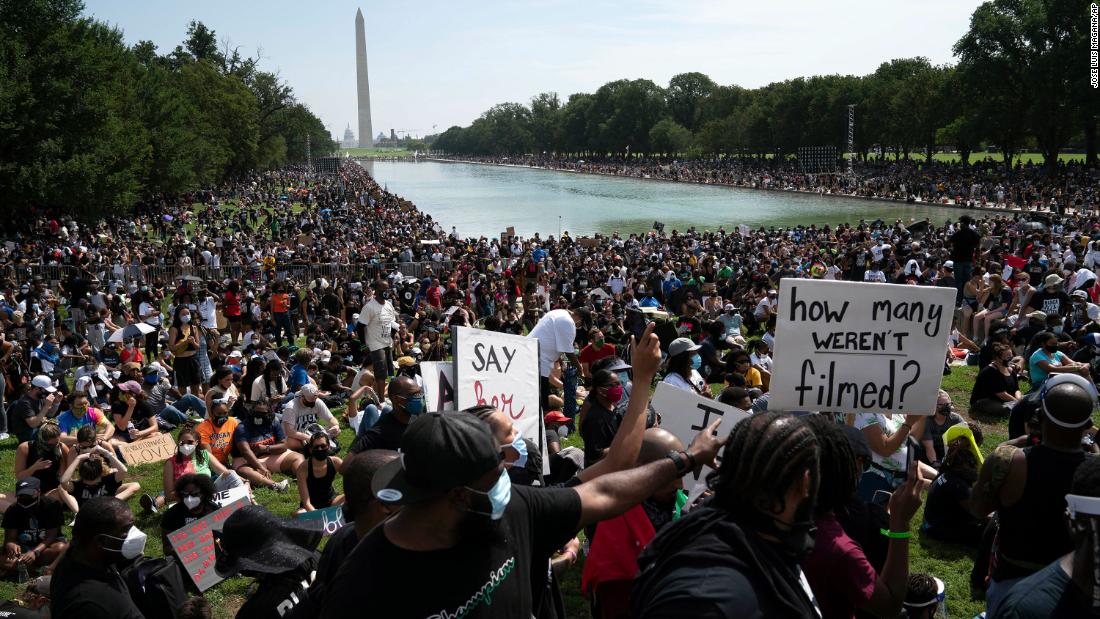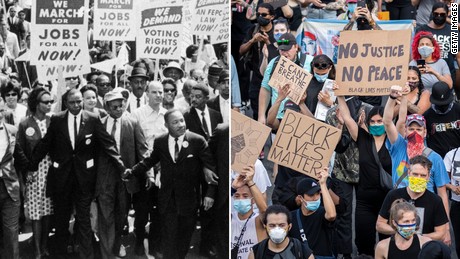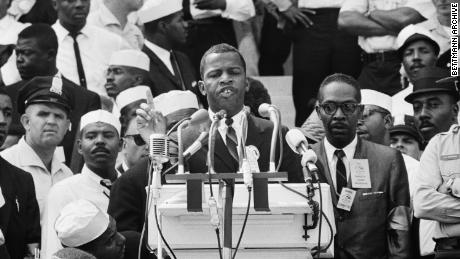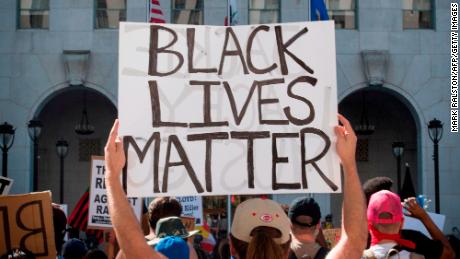‘But we’re gonna stand up,’ says Jacob Blake’s father. ‘Every Black person in the United States is gonna stand up. We’re tired!’
“Black America, I hold you accountable. You must stand. You must fight, but not with violence and chaos,” she said.

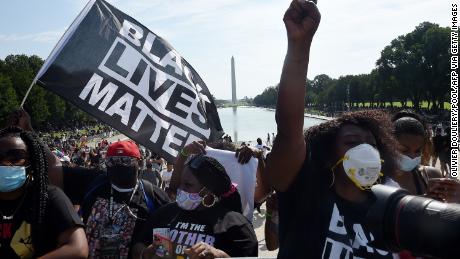
Demonstrators gather outside the Lincoln Memorial for Friday’s march.
“My brother cannot be a voice today. We have to be the voice. We have to be the change,” George Floyd’s sister, Bridget Floyd, said Friday.
The bill — titled the George Floyd Justice in Policing Act of 2020 — would overhaul qualified immunity for law enforcement, prohibit no-knock warrants in federal drug cases, ban chokeholds at the federal level and establish a national registry of police misconduct, among other provisions.
King III spoke against police brutality and for voter action — and called on people to do more than quote his slain dad.
“If you’re looking for a savior, get up and find a mirror. We must be (our own) hero,” by voting and working for social change, King said.
“Raise our voices and say, ‘Enough is enough!'” he said.
Sharpton called for America to never “forget what you’ve done,” referring to police shootings of African Americans. “Call their names.”
“Society had (its) knee on our neck,” he said. “We are rising up. We are going to get your knee off our neck!”
A march to the Martin Luther King Jr. Memorial
Organizers stressed that the march would comply with health guidance and local ordinances. Face masks are required to march, and masks, gloves and hand sanitizer will be provided on site.
Crowds, after the speeches, were to march about a half-mile away to the Martin Luther King Jr. Memorial.
The bill — titled the George Floyd Justice in Policing Act of 2020 — would overhaul qualified immunity for law enforcement, prohibit no-knock warrants in federal drug cases, ban chokeholds at the federal level and establish a national registry of police misconduct, among other provisions.
‘It’s a huge moment for us as a people’
“Fifty-seven years ago, they were here marching on Washington for just equality as a people. Right now, I think this march is about survival,” the man, who gave his name only as Bubba, said.
“There’s no waiting for us to vote. We shouldn’t have to wait for that. That should happen today, to where we shouldn’t have to be out worried about our kids … without having to worry about getting a phone call that they have been shot or killed, especially by police that supposed to protect us,” he said.
Ahead of the main program, recorded messages were played on large screens in front of the memorial, in which speakers called for people to vote and, as one speaker said, “to make those who are comfortable with our oppression uncomfortable.”

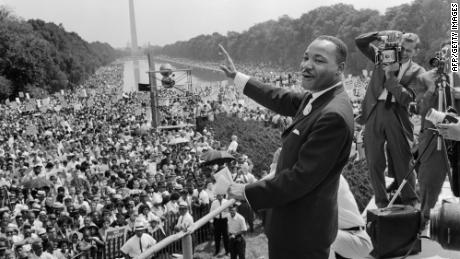
Martin Luther King waves to supporters during the 1963 March on Washington.
Martin Luther King III: ‘Dad would be very proud’
Before the event, Martin Luther King III told CNN that “Dad would be very proud that people are coming together to stand up against injustice.”
“But certainly (he would be) very sad that we’re still attempting to get justice.”

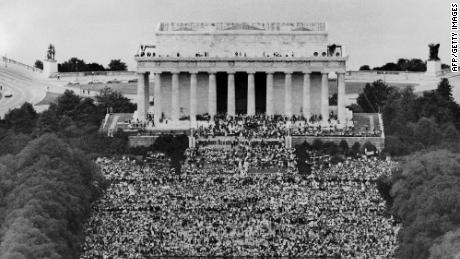
Hundreds of thousands of people gather for the March on Washington for Jobs and Freedom at the Lincoln Memorial on August 28, 1963.
Adding to the urgency for organizers is the November election, the lead-up to which has been marked by a divisive presidential campaign.
“We are on the way to a resolution, I believe, because the consciousness is awakened,” King told CNN before the march. “I don’t think these young people are going to stop. I think they’re going to continue to demand justice.”

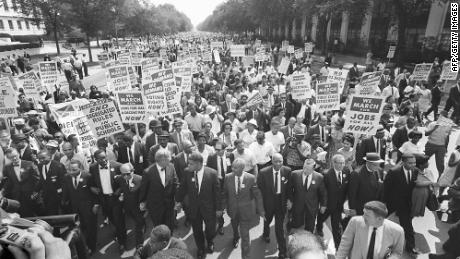
Dr. Martin Luther King Jr, third from left, and other civil right leaders lead the 1963 March on Washington.
Marchers are evoking spirit of John Lewis
Friday’s march also honored the late civil rights icon and congressman John Lewis, who spent his life fighting for voting rights.
At 23, Lewis was one of the youngest keynote speakers at original march in 1963. He was also its last surviving speaker.
“We’re walking in the spirit of Dr. King but also in the spirit of John Lewis to make ‘good trouble,'” Tylik McMillan, the national director of youth and college for Sharpton’s National Action Network (NAN), told CNN last week.
NAN is also encouraging attendees to fill out the 2020 US Census, register to vote, and sign up to be poll workers and monitors.
The Black National Convention will follow
Months before Sharpton announced this year’s march, the Movement For Black Lives (M4BL) — a coalition of progressive Black organizations — was already at work planning another gathering: the Black National Convention.
The event was envisioned as a space where progressive Black organizers could engage outside of the major political parties and discuss policy solutions “without giving up their radical beliefs and values,” said Jessica Byrd, co-founder of the Electoral Justice Project of M4BL.
“Black people have been saying for literal decades that we want a meaningful place inside of the national political dialogue, and meaningful means specific public policy solutions that meet the height of the need and the height of the problem,” Byrd told CNN. “We have yet to have it in this country, on any side.”
M4BL supports several policy positions that are more radical than the ones organizers of Friday’s march are currently demanding. Among them is the Breathe Act, which would divest federal resources from police and invest them into healthcare, alternative community safety solutions and other sectors.
But while there may be some generational differences between the march and the Black National Convention, Byrd said the packed day of events is a sign of the political moment we are in.
“As Al Sharpton announced the march, we immediately thought, ‘Well, it’s going to be the best, Blackest political weekend to end this Freedom Summer,'” Byrd told CNN. “And that’s a good thing for all of us, and in particular, Black voters.”
CNN’s Dakin Andone, Suzanne Malveaux, Veronica Stracqualursi, Eliott C. McLaughlin and Emanuella Grinberg contributed to this report.
![]()


